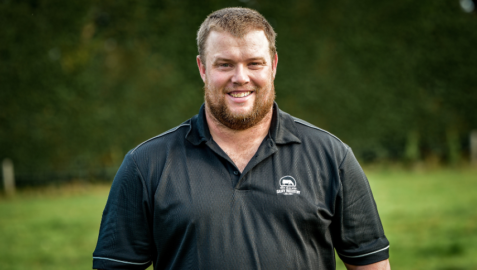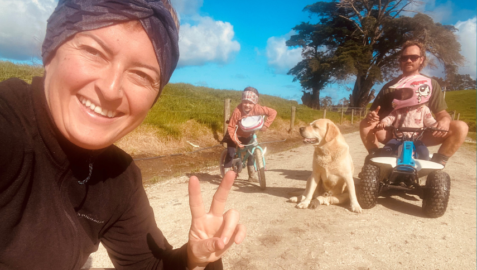
Getting Through Tough Times
Module Overview
Murray Elwood has navigated the ups and downs of the beekeeping industry for over 30 years. He chatted to Farmstrong about how he manages the pressures of an uncertain business.
Tell us about your background
We’re based in Nelson and our business is in the top of the south. I’ve been in the industry about 35 years.
What do you enjoy about the job?
I think it’s the fact that bees are such an intriguing insect. Sometimes I’ll just hold a frame and look at what they’re doing. They’re all busy and they’ve all got their roles. They really are an incredible insect. There’s also the satisfaction in harvest season when you come to a hive with 4 or 5 honey boxes on it, of knowing that you and the team have done what it takes to make it a successful unit.
What are the main pressures?
Over the years, we’ve had some major challenges. Beekeeping is a rollercoaster industry dictated by three things – the weather, hive strength and flowering. If you haven’t got your hive right or haven’t got a flowering or you’ve got poor weather, then you get a very limited crop. A number of years ago even when prices were good, we had a very poor season. It was fifty-fifty whether our business could continue.
What impact did that have on you personally?
I had a year where I barely left the house and was very withdrawn. I felt mentally drained. We were facing the collapse of our business and the fear of failure and what people might think of me, was very real. So, I withdrew.
Can you share how you got through?
What kept me going? My wife and my kids were an amazing source of support for me. The kids were teenagers and just having them round put a smile on my face.
I guess the other thing I learnt during that time was that who I was as a person was far more important than what I achieved. That was a massive lesson. I learnt to accept that even if the business failed, it wasn’t going to be the end of the world for me. I’d just do something else with my life. I’d go and work for wages for someone else if need be.
What else helped?
I had to learn to be more open. I was selective about who I confided in, but I realised I had to be more open, especially with close friends, to deal with how I was feeling. So, my family and friends really helped me through that time and I did come through.
What do you do now to keep well?
There’s an old saying – the best things in life are free. When you’re under financial pressure, the last thing you want to do is spend money. Luckily, I’m a hunting, fishing, outdoors man and you can do all of those things on an absolute shoestring. I just love getting out there in nature with mates and taking a couple of days off. It does me the world of good and it doesn’t cost anything. That’s big for me.
What’s the benefit of taking time out like that?
Sometimes when you’ve got massive list of things to do and you’re losing money while you’re doing it, it’s tempting to think you’ve got to work seven days a week. But that’s the worst thing you can do. You’ve got to take that time out to recharge so you can be more effective in the time you are at work.
How do you do make sure you enjoy the job nowadays, despite all the uncertainty?
We’re beekeeping in some absolutely stunning areas. For me, it’s about standing up from the beehive and just appreciating the moment that you’re in. The view from the top of the hill. The cicadas singing away. It’s just spending a moment to enjoy it.
Where are things at now in the industry?
The prices we’re getting for the honey is less than what it costs to produce it. Financially and mentally that’s very stressful. The prices are low and if you put that on top of a poor season like it was last season, sadly that has already tipped over quite a few beekeepers.
What’s your advice to someone new to the industry and worried?
If you’re new to the industry, then don’t expect to get wealthy. Just do your best to break even or a bit better. Do the simple things right. Make sure your hive health is good but visit your hives as little as you can to limit your spending.
The other thing is stay connected. You can’t work out every single problem yourself. Beekeepers are often loners. They like to do their own thing their own way. That’s why they got into the business. But when you get tough times, it’s important to have Apiculture NZ behind you. Sometimes advice from another beekeeper is like gold. Having that collective input gives you a new way of looking at things.
Any advice for people who feel stuck?
If things are too tough, seek advice on an exit strategy. You might not get a lot for your business as it is now, but you’ll save the other assets you’ve built up. If you can’t see a way forward, you’ve got to be willing to let it go.
It’s about realising that’s there’s always something else for you around the corner. If you’ve had a successful business, you can have one again. It’s just that the current pricing is very hard. Even if you love beekeeping, you’ve got to work out a way where you’re not losing money.
Any final advice?
One thing I would say is that I think it’s great that Farmstrong is advocating about mental health. In the past, it was a taboo subject. We were all good Kiwi men who never had a weak moment. But that was never true. Everyone needs a hand, and everyone needs support at some stage.
Last year 14,000 farmers and growers increased their wellbeing thanks to something they learnt from Farmstrong. To find out what works for you and lock it in, visit www.farmstrong.co.nz for free tools and resources.


